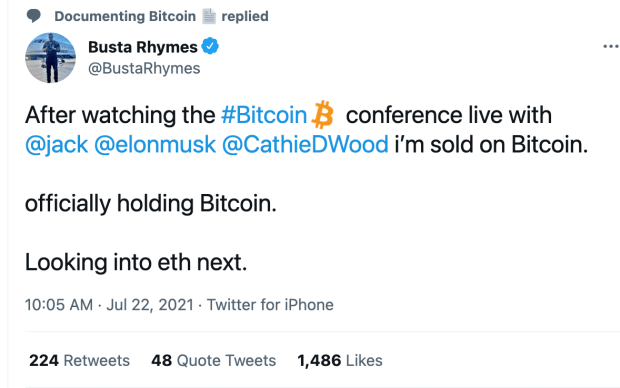How Bitcoin Improves Water Abundance In Water Scarce Nations
The “bitcoin uses fossil fuels” argument has been increasingly breaking down in the face of new data from Bloomberg Intelligence showing the network is in fact the most sustainable-energy backed industry on the planet with 53% energy coming from sustainable sources.
In response to this news, a new attack vector has emerged: “Bitcoin uses too much water”. Apparently if Bitcoin uses fossil fuel as its energy source it is bad, but if it uses hydro it is also bad: it’s the same double-bind that 17th Century witch-hunters used to determine whether a woman was a witch: “Throw her in the water. If she can swim, she’s a witch – execute her. If she drowns and cannot swim, that proves she’s not a witch”.
It is of course a ridiculous argument that can be leveled against any user of electricity you feel like maligning. As for the method that de Vries, the study’s author uses: measuring water use per transaction, Cambridge has already debunked the use of energy per transaction, and by extension any resource on a per transaction basis, as “not a meaningful metric”.
This didn’t stop a host of journalists picking up the study. As I waded through the symphony of off-tune journalism, it got me curious, “What is the real story with Bitcoin and water?”
So I decided to do some research on the other side of the ledger: could Bitcoin help water security?
Where Does Actual Water Scarcity Exist?
First, let’s understand which nations suffer the most from water scarcity? A quick Google search told me that “12 of 17 most water-stressed nations in the world live in the Middle East or North Africa.”

Satista
Intrigued, I enquired further as to how these countries countered this water scarcity.
It turns out the situation is quite dire:
- 60% of these nation live under “severe water stress”
- scientists expect this to worsen as the climate warms
- In the last 30 years, rainfall has dropped by 16.7%
- Many of these nations now use more water than they receive in rainfall.
-Source Could the Middle East Run Out of Water, CNBC
Wealthier countries such as UAE use desalination to solve this issue. However, desalination is expensive and energy intensive. It also has a host of environmental issues, not least of which is that fact that in the UAE, 78% of that energy comes from fossil fuel (natural gas).

According to The National News, desalination plants are vital if the world is to have enough water to drink.
Some estimates suggest that by 2030 there will be a 40 per cent gap between water supply and demand. There is an increasing reliance on desalination across the world, and already 53% of all desalination worldwide happens in the Middle East.

Efforts are afoot to power desalination plants increasingly with renewable energy, however such projects will take time. New technology will have to be developed, and new solar capacity will have to be built.
Dr Muhammad Wakil Shahzad, a senior lecturer at Northumbria University in the UK, who has developed a patented desalination system confirmed this saying “We’re working to hybridize [desalination systems] with renewables – wind, wave and solar. We have several prototypes in the lab,” he said.
These solar farms can be used to offer an alternative to burning natural gas to power desalinisation plants” Critically, the UAE plans a massive solar buildout in its vast, sunny deserts. The country’s biggest solar project will become one of the world’s largest at 5 GW by 2030.
Jaran Mellerud, Luxor comments that These solar installations “will undoubtedly periodically generate vast amounts of excess electricity.”
How Bitcoin Helps Water Scarcity #1: Accelerate Buildout Of Renewable Powered Desalination
Soaking up and being a buyer for excess solar-powered electricity is one of the two areas where Bitcoin mining can help provide solutions to water scarcity.
According to Mellerud “Being location-agnostic and interruptible electricity consumers, bitcoin miners can set up operations directly at these solar farms to offtake and monetize this otherwise wasted electricity.” (Source: HashrateIndex). A recent study from Cornell University confirmed Bitcoin mining’s ability to make solar operators more profitable, which in turn leads to faster scale-up of solar operations.
By accelerating the build-out of new solar energy capacity, Bitcoin mining can help UAE to transition to renewably-powered desalination, meaning that UAE can meet its water security goals without endangering its emission-reduction goals.
How Bitcoin Mining Helps Water Scarcity #2: Increases Efficiency Of Desalination
As reported by CNBC, desalination is highly energy intensive. Any efficiency gains in operating costs therefore means that water which can be desalinated for the same operating cost. This is why UAE water management, whether through desalination or underground aquifers, is on a constant vigil to increase efficiency of operations.
This is where an exciting and pioneering Bitcoin mining project is already underway. Marathon Digital Holdings recently partnered with Zero Two.
Normally heat is used directly for desalination. But Zero Two and Marathon realized that almost 100% of the energy used by Bitcoin mining rigs is transferred into heat energy. If that heat can be recycled, it can be reused. And that recycled heat is now being used for water desalination. The only difference is that in the meantime, the desalination facility is earning revenue from bitcoin mining, meaning that their water-per-dollar ratio improves: more water can be desalinated for the same net cost – an incredible achievement. Marathon CEO Fred Thiel explains that for the water desalination facility, bitcoin mining “allows them to continue to run the energy generation profitably so that they can use the heat off take to make desalinated water.”
Summary:
The places in the world where water is the most scarce, becoming even scarcer is the Middle East.
For these nations, desalination is the ideal solution – which is why 53% of all desalination now occurs in the Middle East. However desalination is carbon-intensive and energy-intensive. Bitcoin mining helps address both problems. Firstly, It helps the carbon-intensity by making Middle East solar deployments more profitable by being a buyer for energy that otherwise would have been wasted. Secondly, it makes desalination plants more profitable by allowing them to generate bitcoin and use the waste heat from ASICS for desalination, which means these plants can profitably desalinate more water.
In short: Far from being a source of concern to global water usage, Bitcoin is helping the places in the world where water is scarcest to secure their water security profitably without jeopardizing their emission targets – something no other technology can currently do.
This is a guest post by Daniel Batten. Opinions expressed are entirely their own and do not necessarily reflect those of BTC Inc or Bitcoin Magazine.









